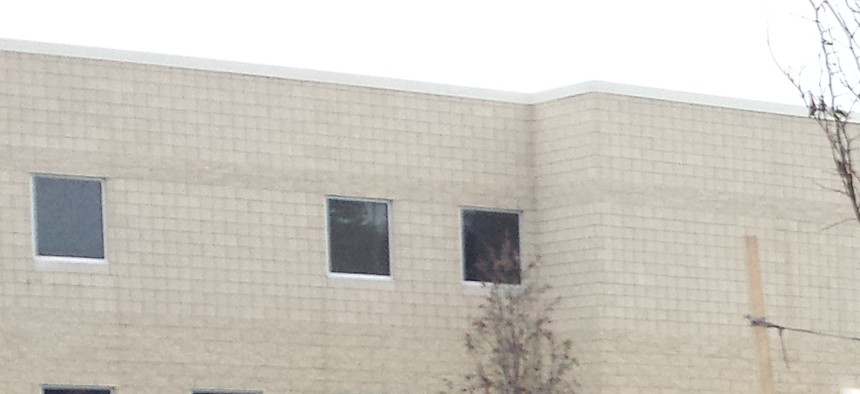Michigan’s Long Bumpy Road-Funding Journey Heading to Special Election

Carlton Avenue SE in Grand Rapids, Michigan, has been in a terrible state of repair for years. Michael Grass / GovExec.com
As state lawmakers put the fate of fixing roads up to a public vote, some local governments are looking for solutions of their own.
GRAND RAPIDS, Mich. — Driving along Carlton Avenue SE in the Eastown neighborhood, it’s easy to see progress being made to repair what has been for years one of the worst roads in Michigan’s second-largest city. Roughly half of this residential thoroughfare between Fulton Street and Lake Drive has been resurfaced in recent months. There are new curbs, too.
But the other portion looks like so many other streets in cities across the Great Lakes State: It’s cracked in multiple directions, pox-marked with plenty of bumps, patched up in parts and worn down elsewhere by road salt and harsh winter elements. (Grand Rapids recorded 116 inches of snow last winter.)
But more money to repair the long-neglected roads in Grand Rapids is on the way. This spring, local voters approved a “streets tax” in a special election that city officials say will bring 70 percent of the city’s 588 miles of streets into fair to good condition in 15 years. It’s the first such income-based tax for city street repairs in Michigan, according to The Grand Rapids Press.
In June, Grand Rapids officials announced that they would borrow $17 million to get a jumpstart on repairs to 28 miles of local roadways before revenue from the new streets tax kicks in later in 2015. And Carlton Avenue was on the list of streets targeted for repairs.

A section of Carlton Avenue in Grand Rapids (Photo by Michael Grass / GovExec.com)
As Grand Rapids moves forward on getting its streets into a better state of repair, what about the rest of Michigan?
Don’t look to state leaders for a solution.
In Lansing, lawmakers at the State Capitol in December failed to come up with legislative compromise in their lame duck session to fund road repairs. Instead, they authorized a May 2015 ballot initiative that will let voters decide whether to raise the state’s sales tax from 6 percent to 7 percent to fund road repairs.
As The Detroit News wrote in an editorial:
Rather than a clean, legislative fix that would have raised fuel taxes and allowed the task of rebuilding Michigan's highways to begin with the spring construction season, lawmakers are instead betting that voters will agree to a massive tax hike and shift that will raise funds to be spent not only for roads, but a variety of other purposes as well.
And if voters reject the scheme, the state and its motorists are back to square one, with no additional road funds and even less hope for finding an answer.
[Gov. Rick] Snyder is convinced that the horrible condition of Michigan's roads and the wear and tear they take on vehicles is enough to convince voters to support a higher tax. The May vote will come at the worst of the pothole season, and in a low turn-out election.
Various interest groups, from the Michigan Chamber of Commerce to Americans for Prosperity, have been lining up their support or opposition to the plan, the Lansing State Journal recently reported.

At a December press conference, Gov. Rick Snyder holds up a chunk of concrete that fell from an overpass. (Image via GovSnyder / YouTube)
And what if the state ballot initiative fails in May?
Local officials across the state may look for a Grand Rapids-style streets tax solution for their communities.
“Quite frankly, what we’ll probably see if we don’t get road funding accomplished [at the state level] is we’re going to see many more of our communities needing to go and do that, not from an expansion type of look but from a maintenance and preservation look,” John LaMacchia, a legislative associate for the Michigan Municipal League, told The Grand Rapids Press in May.
Voters in the city of Muskegon rejected a streets tax in November. Voters in Muskegon County will consider a special tax for road improvements in February.
In East Grand Rapids, residents there will vote on a streets tax in May. “We’ve put the Band-Aids on for so long,” City Manager Brian Donovan told the Press. “It’s become apparent that those Band-Aids aren’t lasting anymore. We have to put the money into reconstruction.”






